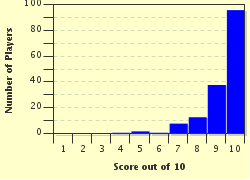Quiz Answer Key and Fun Facts
1. "There was a crooked man, and he walked a crooked mile.
He found a crooked ______ upon a crooked stile."
What word goes in the blank?
2. "Pussy cat, pussy cat, where have you been?
I've been to London to look at the Queen.
Pussy cat, pussy cat, what did you do there?
I frightened a little ____ under her chair."
What did the cat frighten?
3. "Ding, dong, bell,
______'s in the well.
Who put her in?
Little Johnny Flynn.
Who pulled her out?
Little Tommy Stout."
Who was in the well?
4. "Jack and Jill went up the hill,
To fetch a pail of water.
Jack fell down and broke his ____,
And Jill came tumbling after."
What did Jack break?
5. "Mary, Mary, quite contrary,
How does your garden grow?
With silver bells and _____ shells,
And pretty maids all in a row."
What kind of shells did Mary have in her garden?
6. "Little Jack Horner sat in a corner,
Eating his Christmas pie;
He stuck in his thumb, and pulled out a ____,
Saying 'What a good boy am I."
What fruit did Jack enjoy?
7. "Jack be nimble, Jack be quick,
Jack jump over the ______."
What object did Jack jump over?
8. "This little piggy went to market, this little piggy stayed home,
This little piggy had ____ _____, this little piggy had none."
What food did the third little piggy enjoy? (two words)
9. "All around the _______ bush, the monkey chased the weasel,
The monkey thought it was all in fun,
Pop! Goes the weasel."
What kind of bush was it?
10. "Diddle, diddle, ____, my son John,
Went to bed with his trousers on;
One shoe off, and the other shoe on,
Diddle, diddle, _____, my son John."
What word describes John?
Source: Author
daver852
This quiz was reviewed by FunTrivia editor
looney_tunes before going online.
Any errors found in FunTrivia content are routinely corrected through our feedback system.


